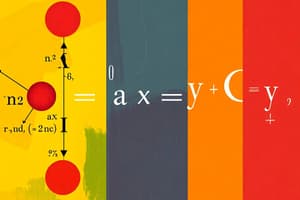Podcast
Questions and Answers
What role does predicate logic play in database management systems?
What role does predicate logic play in database management systems?
- Creates conditional statements in programming languages
- Helps model real-world situations through structured data (correct)
- Determines if a condition has been met in boolean functions
- Analyzes arguments based on principles of truth and validity
How does discrete mathematics contribute to modern technology?
How does discrete mathematics contribute to modern technology?
- By structuring information through logical operations (correct)
- By employing logic to provide structure to information
- By analyzing arguments based on truth and validity
- By providing a foundation in mathematical thinking and analytical skills
Which field benefits from the practical applications of discrete mathematics?
Which field benefits from the practical applications of discrete mathematics?
- Computer science only
- Number theory only
- Cryptography only
- Various fields including computer science, cryptography, and graph theory (correct)
What is a significant advantage of using quantified formulas in databases?
What is a significant advantage of using quantified formulas in databases?
How do programming languages like Python and Java utilize boolean functions?
How do programming languages like Python and Java utilize boolean functions?
Why is mastering discrete mathematics principles beneficial regardless of the profession?
Why is mastering discrete mathematics principles beneficial regardless of the profession?
What is the primary focus of discrete mathematics?
What is the primary focus of discrete mathematics?
Which of the following is NOT a branch of discrete mathematics?
Which of the following is NOT a branch of discrete mathematics?
What is the primary objective of propositional logic?
What is the primary objective of propositional logic?
Which statement is true about propositional logic?
Which statement is true about propositional logic?
What is the primary difference between propositional logic and predicate logic?
What is the primary difference between propositional logic and predicate logic?
Which of the following is NOT a characteristic of predicate logic?
Which of the following is NOT a characteristic of predicate logic?
Flashcards are hidden until you start studying
Study Notes
Discrete Mathematics - A Study of Structured Information
Discrete mathematics is a branch of mathematics dedicated to solving problems with discrete data. It deals with structures that can only take particular values. This field encompasses various mathematical concepts such as logic, combinatorics, graph theory, and cryptography. In this article, we will focus primarily on the topic of logic within discrete mathematics.
Understanding Logic
Logic is a fundamental component of discrete mathematics. It involves the study of arguments and reasoning based on the principles of truth, validity, rules of inference, and deduction. Two elementary logical systems exist: propositional logic and predicate logic. Both systems serve to analyze the structure of arguments using formal proof methods.
Propositional Logic
Propositional logic is the logic of propositions and truth values. It deals with abstract relationships between statements. The main objective of propositional logic is to identify whether a given argument can be deduced from another using logical reasoning. Its rules follow the principles of classical two-valued logic, where any statement must either be true or false but never both simultaneously.
Predicate Logic
Predicate logic extends propositional logic by considering quantifiers that refer to collections of objects rather than just individual objects. This system allows for more complex arguments involving multiple variables and predicates. For example, instead of stating that all birds fly, predicate logic would allow for describing the concept of flying within the broader context of the avian species.
Application of Logic in Discrete Mathematics
The study of discrete mathematics employs logic extensively due to its ability to provide structure to information. Many aspects of computer science rely heavily on these concepts, especially when dealing with boolean functions, which are used to determine if a condition has been met. Programming languages like Python and Java utilize boolean functions to create conditional statements.
Moreover, predicate logic plays a critical role in database management systems because it helps model real-world situations through structured data. By using quantified formulas, databases can represent complex relationships among entities without being overwhelmed by the sheer volume of data. Through this representation, logical operations become possible, allowing users to query their databases efficiently and effectively.
Why Study Discrete Mathematics?
Discrete mathematics offers numerous practical applications across various fields, including computer science, cryptography, graph theory, number theory, and theoretical probability. The subject provides students with a strong foundation in mathematical thinking and analytical skills essential for solving complex problems. Additionally, studying discrete mathematics opens up opportunities in research areas such as combinatorics, complexity theory, and cryptography.
Summary
To conclude, discrete mathematics is a vital field that significantly contributes to modern technology through its subdivision of logic. By understanding how to analyze arguments based on principles of truth and validity, we gain valuable insights into structuring information and making informed decisions. As we continue to advance technologically, mastering the principles of discrete mathematics will undoubtedly prove beneficial no matter the profession or pursuit.
Studying That Suits You
Use AI to generate personalized quizzes and flashcards to suit your learning preferences.




